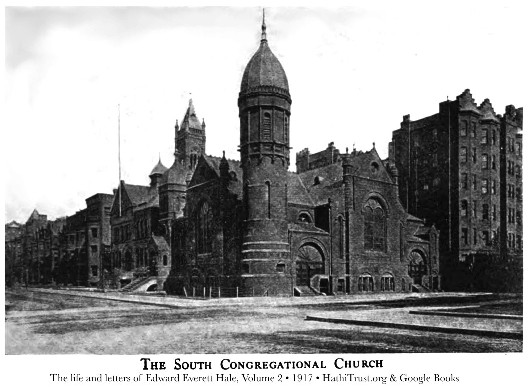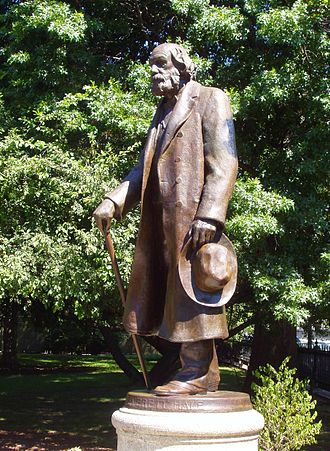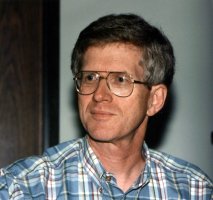 Always Looking – People Who Made A Difference XXVII
Always Looking – People Who Made A Difference XXVII
By
John I. Blair
Edward Everett Hale
Edward Everett Hale (1822-1909) was one of the most prominent American ministers of the last half of the nineteenth century and a popular journalist, editor, and author. His short story, “The Man Without A Country,” has been read by generations. (See pic below) An active social reformer, he founded the Lend a Hand Society to help people needing financial assistance.
Hale was born in Boston. His father, the owner and editor of the Boston Daily Advertiser, had a great influence on Hale, who stated that he found it “hard to think of any real knowledge of any sort which I have ever had, on any subject, of which I did not trace the ‘origins’ to him.”
When Hale was thirteen he entered Harvard. “I was sternly old-school; thought Mr. Emerson half crazy; disliked abolition; doubted as to total abstinence, and in general, followed the advice of my Cambridge teachers, who were from President down to janitor, all a hundred years behind their time.” Still, he graduated second in his class, Phi Beta Kappa, and the commencement poet.
He wanted to be a minister as long as he could remember, but his first job was as a Latin teacher. Then he worked for his father as a journalist and began to try his hand at fiction. The first story to be published was in 1842. He was ultimately the author of almost countless stories, novels, and articles.
This period, 1839-46, also found him training for the ministry. On being accepted, he spent the next four years preaching whenever he had the opportunity. As his ministerial skills improved so did his writing ability. More importantly, his mind and intellect matured and the subjects that he wrote about broadened to include historical and moral matters. His March 1845 pamphlet, “A Tract for the Day: How to Conquer Texas, Before Texas Conquers Us,” was issued as Congress debated annexing Texas as a slave state. Hale argued that it should be admitted but as a free state. He was by now an abolitionist.
Hale was ordained and installed as minister of the Church of the Unity in Worcester, Massachusetts in 1845. He thought of a church “as one of the active social factors in American Life, working by whatever personal or institutional means suggested themselves, toward the up-building of the community in which it existed.” That view remained constant throughout his life, as did his religious faith, which he defined succinctly as “Our Father who art.” “I can tell you in very few words what I believe. I believe that God is here now, and that I am one of his children whom he dearly loves . . . the truth is, that what a man needs is to live as much as he can . . . For faith, the soul needs to pray simply to God, ‘Father—help me,’ [and] that is quite enough and to act bravely on what faith it has already.”
As he became comfortable in his new role, he enlarged his ministry. He refused to serve on the school board, choosing instead to work with the poor. Such “practical philanthropy,” along with private generosity, became a hallmark of his ministry.
When Congress opened the Kansas and Nebraska territories for settlement in 1854, Hale urged non-slave holders to emigrate to keep these future states “free.” To achieve this goal, he helped form the New England Emigrant Aid Company.
In spring 1856 the South Congregational Church in Boston, Massachusetts asked him to be their minister. He returned to Boston and served them for the next 43 years.
In 1858 Hale formed a society called “The Christianity Unity.” Its purpose was for mutual friendship and assistance, accomplished “by strict temperance and purity of life, and by fulfilling the duties of good citizens and friendly neighbors.” For years he was its president, seeing it as part of his regular church duties.
During the Civil War Hale worked with the United States Sanitary Commission and its president Henry Whitney Bellows to improve the dire health and medical situation facing wounded soldiers and those living in army camps. Throughout the war Hale urged military enlistment. To promote patriotism, he composed his most famous short story, “The Man Without a Country.” It was published in the Atlantic Monthly for December 1863, and told the tale of the traitor Philip Nolan who, when convicted, declared that he never wanted to hear again of the United States. As a result his punishment was imprisonment at sea for the rest of his life. The story’s call for patriotism during the Civil War influenced Hale's generation, and those that followed, and made him a national figure. Before, he wrote, “I was only known in Boston as an energetic minister of an active church; then the war came along and brought me into public life, and I have never got back into simple parish life again.”
Hale’s second most popular and influential story, “Ten Times Ten is One” had been published in 1870. Its hero Harry Wadsworth and his motto to “Lend a Hand” immediately resulted in the formation worldwide of hundreds of “Lend-a-Hand Clubs,” “Look-up Legions,” and “Harry Wadsworth Clubs.” Eventually the Ten Times One Corporation was formed, becoming in 1898 the non-sectarian Lend A Hand Society. Its headquarters was in Boston and Hale served as president until his death. Working in collaboration with other charities it still offered programs and services in 2014, even though all the clubs had long ago ceased to function.
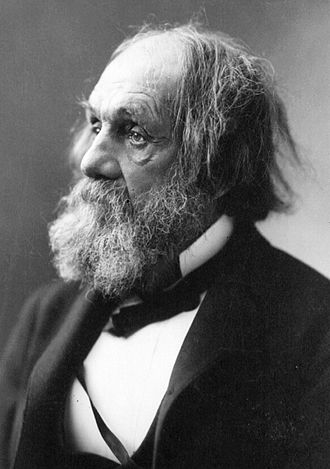
|
Edward Everett Hale 1902 |
Hale died on June 10, 1909. The day before he had attended the annual meeting of the Lend a Hand Society. It was an appropriate final activity for, as The Boston Transcript declared, next to “unity among the religious denominations” that Society “was probably the nearest to his heart of his many interests.” In 1913 a life-size bronze statue of Hale was erected in the Boston Public Garden. Funded by public donations, it was created by sculptor Bela Lyon Pratt. It shows an elderly Hale, hat in one hand, cane in the other, strolling through the Boston Public Garden. A fitting tribute for an optimist who taught people to, “Look up and not down. Look forward and not back. Look out and not in. Lend a hand.”
Adapted and abbreviated by John I. Blair from the Dictionary of Unitarian and Universalist Biography article. Link Biography article Link
Blair adds this personal note: This is a favorite quote of mine – we have it in our church hymnal as a reading.
I am only one,
But still I am one.
I cannot do everything,
But still I can do something;
And because I cannot do everything,
I will not refuse to do the something that I can do.
Edward Everett Hale.
Click on author's byline for bio and list of other works published by Pencil Stubs Online.
Below:Book Cover
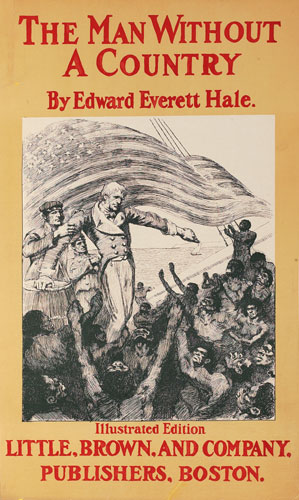
|



